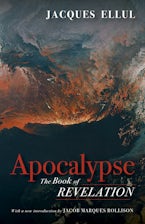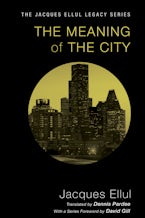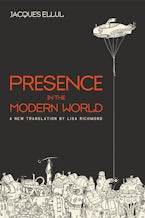- Home
- Jacques Ellul Legacy Series
- religion
- Apocalypse
Apocalypse
The Book of Revelation
Introduction by Jacob Marques Rollison
Series: Jacques Ellul Legacy Series
Imprint: Wipf and Stock
304 Pages, 5.50 x 8.50 x 0.57 in
- Paperback
- 9781532684456
- Published: May 2020
$35.00 / £31.00 / AU$51.00
BuyOther Retailers:
"There has never been a book provoking more delirium, foolishness and irrational movements, without any relationship to Jesus Christ [than the Book of Revelation]." - Jacques Ellul, Introduction
Known for his trenchant critique of modernity and of those Christians who celebrate their captivity to it, Ellul here cuts to the heart of the theological intention of the Book of Revelation, and thereby reveals the liberating gospel in all its offensiveness. Neither an exhaustive commentary nor a work of historical-exegetical analysis, Apocalypse is a provocative, independent interpretation. Ellul seeks to rescue Revelation from the reassuring and orthodox banality to which commentators often reduce it. The goal is to perceive the totality of the book in its movement and structure. "Architecture in movement" is the key to understanding Revelation's puzzling but simple message. This edition also comes with a new foreword by Jacob Marques Rollison who provides an essential aid for guiding readers through Ellul's thorough engagement with Revelation.
Jacques Ellul (1912–1994) was a French law professor, social theorist, and lay theologian, teaching at the University of Bordeaux, France. Among his 58 published books, his best-known works include The Technological Society, Propaganda, The Humiliation of the Word, and Hope in Time of Abandonment.
"In Apocalypse, Ellul describes the New Jerusalem as the reverse image of the fallen global city. Apocalypse is not about changing worlds but about changing the world. The Book of Revelation is an iconoclastic mirror for the world in this present moment.
—Darrel Fasching
“Those who read the Bible for nourishment generally see the New Testament book of Revelation as bizarre and forbidding. Jacques Ellul sees it as ‘written for movement, play of colors, multiple interaction, multiple meaning.’ Revelation's interpreters have made piecemeal use of its imagery, or treated it as a coded message of fortitude. Ellul ignores neither symbolical detail nor historical setting, but looks mainly to the structure of the book and the overall message it conveys now, as at the time of writing.”
—Kirkus Review











